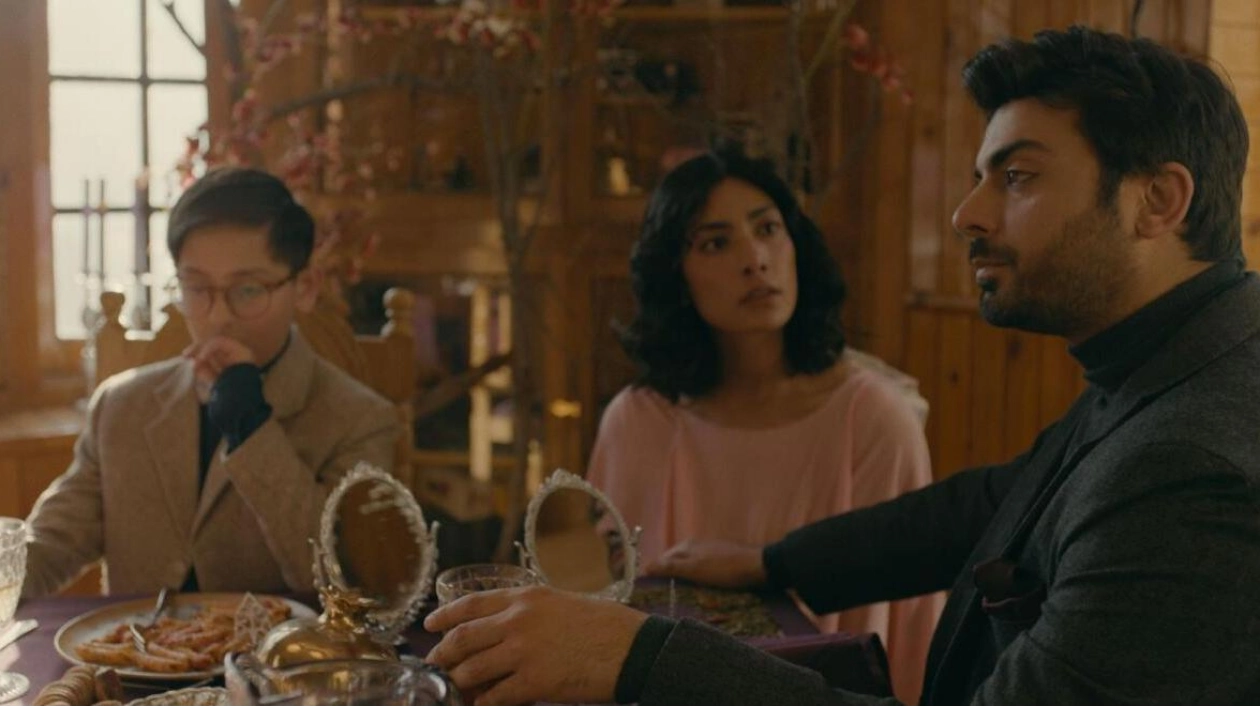Asim Abbasi's highly anticipated mini-series, Barzakh, has finally debuted on Zee5 Global. Written and directed by Abbasi, and produced by Shailja Kejriwal, the series features Fawad Khan, Sanam Saeed, and M. Fawad Khan, alongside Khushhal Khan, Sajid Hasan, Salman Shahid, Nighat Choudhry, and Uzma Beg. Set in the fictional 'Land of Nowhere,' the story revolves around the eccentric Jaffar Khanzada (Salman Shahid), who is preparing for his third marriage, despite his previous wives having mysteriously died. He claims his new bride, Mehtab, is his 'everlasting' love, even though she has been deceased for 60 years. His sons, Sheheryar (Fawad Khan) and Saifullah (M. Fawad Khan), arrive to visit, and Khanzada's assistant, Scheherzaade (Sanam Saeed), guides the audience through a mystical journey that explores themes of love, capitalism, mysticism, and romanticism.
Filmed against the breathtaking landscapes of Pakistan's northeastern mountains and valleys, Barzakh sets a tone of otherworldliness. The narrative, rich with metaphors and allegories, diverges significantly from Abbasi's previous works, such as Churails and Cake, which were grounded in practical stories with larger-than-life characters. Drawing inspiration from Aronofsky and Bergman's symbolic styles, Abbasi crafts a unique narrative within a Pakistani setting, addressing themes of naked capitalism, land usurpation, the loss of love and soul, the formation of new bonds, and the often bitter and crass nature of life, as exemplified by Khanzada. Scheherzaade introduces the audience to this mystifying world of Barzakh, which also subtly echoes Wes Anderson's stylistic touches, with the protagonists confined in a vibrant sanctuary that hides deeper secrets.
Mo Azmi's cinematography is breathtaking; his meticulous choice of lighting for each scene creates a rich tapestry for Abbasi's storytelling. Many scenes resemble Renaissance paintings brought to life. Abbasi's wardrobe choices, reminiscent of a resort collection, feature deep, rich colors that evoke warmth, contrasting with the expansive, empty valleys that unsettle the viewer. He also uses close-up shots to evoke feelings of frustration and isolation. The narrative begins with a naive young couple pledging their love, only for life's harsh realities, including money and death, to tarnish their romantic ideal.
The standout element of Barzakh is Fawad Khan, whose limited screen time is nonetheless captivating. His subtle glances and classic smirks transform the mundane into the extraordinary. With impeccable comedic timing, expressive eyes, and a commanding control over his voice, Khan's scenes are the highlight of the series. Sanam Saeed provides the gravitas needed for the story's absurd premise, her voice growing stronger as she aids the increasingly maddening Khanzada. Sajid Hasan, as Lumberdaar, Khanzada's brother, serves as the moral compass in a world that seems to be losing its sense of right and wrong.
Barzakh's main drawback is its pace, which mirrors that of live theater, potentially frustrating audiences accustomed to the fast-paced nature of OTT platforms. The abundance of allegories detracts from the central narrative and deeper conflicts that could have been more compelling. Unresolved metaphors, the burden of the dead wives, the tree of longing, and literal symbols in the locals' homes urging Khanzada to cease his madness, all feel disconnected from the core story. Future episodes may provide more context, but the first episode's screenplay fails to cohesively deliver the intended impact.
The series is primarily for Fawad Khan's devoted fans, who will relish seeing him on screen after a long absence. It may also appeal to those seeking unconventional, artistic, and intellectual themes within a Pakistani context. However, it is hoped that subsequent episodes will reveal more and tell the story more cohesively, as the premise has the potential to be timeless and enduring.






